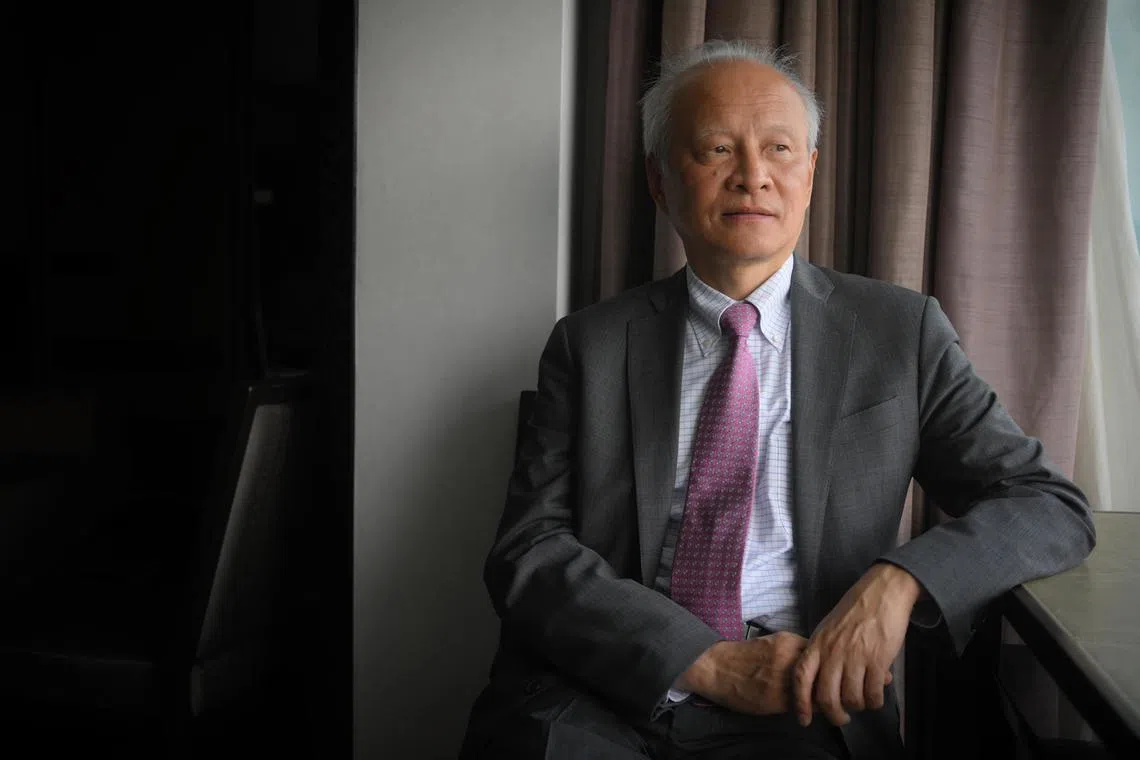Enough channels of communication, but insufficient political will to resolve China-US conflict: Cui Tiankai
Sign up now: Get ST's newsletters delivered to your inbox

China's reluctance to come to the table for talks is due to a perception that the US has not kept its word, said retired diplomat Cui Tiankai.
ST PHOTO: MARK CHEONG
Follow topic:
SINGAPORE - There are concrete steps, big and small, that the United States can take to show goodwill in its call for high-level defence talks to resume with China – such as by halting military deployments to the latter’s “doorstep”, said retired veteran Chinese diplomat Cui Tiankai.
He added that China’s reluctance to come to the table for talks,
In an interview on the sidelines of the security forum, Mr Cui, who was China’s longest-serving ambassador to the US from 2013 to 2021, said there are adequate channels of communication between both sides, but insufficient political will – on the US’ part – to prevent conflicts.
He cited America’s military deployments near China, which he said should be eased. This comes just after an American guided-missile destroyer and a Canadian frigate sailed through the Taiwan Strait, while being tracked closely by China’s navy and air force.
“Some people are talking about our ships apparently getting too close to their ships and their plane. But the real question is, why are they coming all the way across the ocean, to our doorstep? They’re getting too close to our territories, to our territorial waters. It’s certainly a disrespect of other countries’ sovereignty and territorial integrity.”
Mr Cui also criticised the US’ tendency for unilateral actions, such as the sanctions it imposed on China’s Defence Minister Li Shangfu
China has cited the maintenance of US sanctions on General Li
Defence Secretary Austin on Sunday dismissed this as a “false narrative” by China.
“I’m sure that I’m personally sanctioned in Russia,” he said, before leaving Singapore for India. “But I can, if I want”, still speak with Russia’s Defence Minister, he added.
Asked about quicker practical steps that the US can take to pave the way for talks, Mr Cui said wryly that “nothing is easy in China-US relations, I can promise you”.
But as an “easier” start, more direct flights between the two countries should be restored, to pave the way towards more linkages, he said.
American airlines have yet to restore the number of flights to pre-Covid-19 pandemic levels, citing the cost and time savings that Chinese carriers accrue by flying over Russian airspace on US routes, and have supported US senators’ urging of the Biden administration to stop them from doing so.
Weekly flights by airlines on both sides are now in the low tens, down from 300-plus previously.
“There are too few of them,” said Mr Cui. “Of course, Covid-19 was a problem. But now it’s almost over. We have other obstacles. And the tickets are very expensive. But so many people want to travel. So, at least, we could have more flights. It is for mutual benefit, and I think this should be easier to do.”
In the worsening US-China relationship, both sides charge the other party with upsetting the delicate balance in the Taiwan Strait.
China points to the US’ increasing arms sales to Taiwan and then House Speaker Nancy Pelosi’s visit to the island
At the forum, Mr Austin made clear that the US’ policy will not change, saying: “Deterrence is strong today – and it’s our job to keep it that way.”
But such moves, said Mr Cui, illustrate a lack of good faith, with the US going back on its word after Mr Biden met Mr Xi
Soon afterwards, the US sent new arms to Taiwan, and pledged to increase security cooperation with the self-ruled island through providing billions of dollars in aid.
As China’s envoy to the US for almost a decade spanning three US presidents – Mr Barack Obama, Mr Donald Trump and Mr Biden – Mr Cui’s conclusion is that the US domestic political system hobbles its ability to be consistent.
“I’ve been present at almost all the meetings between my president and three different US presidents. And our position has been very consistent.
“In President Xi Jinping’s words, we want to base our relations with the United States on the principles of mutual respect, peaceful coexistence and win-win cooperation. He proposed the same ideas to President Obama, to President Trump, and to President Biden.
“And we’re still waiting for a positive and constructive response.”

